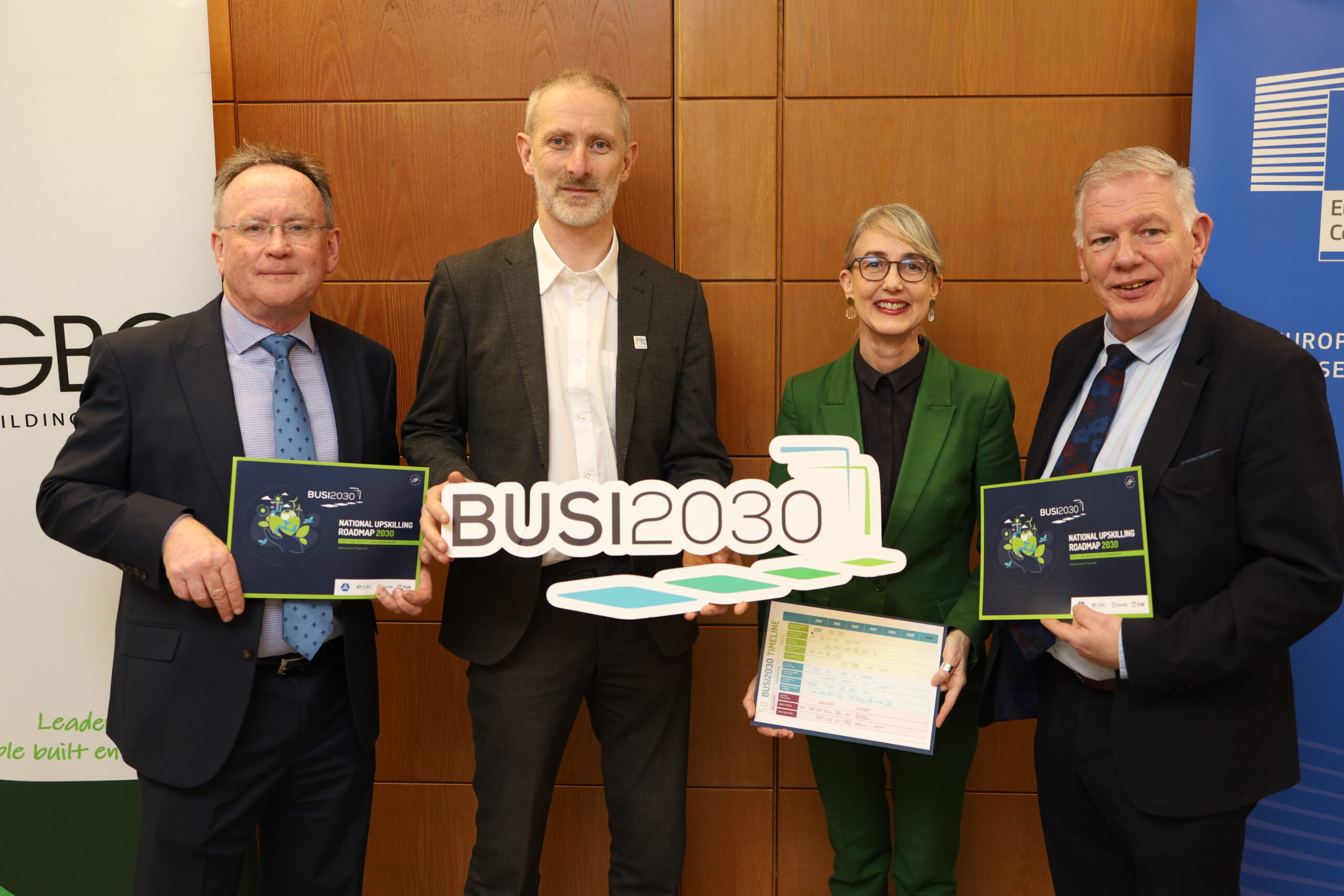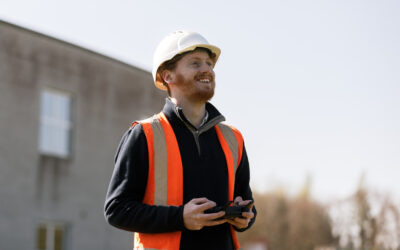Pictured above are Dermot Carey, CIF Director of Safety & Training; Seamus Hoyne, Dean of Flexible and Work Based Learning, TUS; Sinéad Hughes, IGBC Programme Manager and Pádraig Boland, FET Strategic Manager with LOETB
The construction industry must embrace digitalisation, low carbon construction and Modern Methods of Construction such as offsite and modular building, while focusing on improving the diversity of its workforce.
This is according to a new report – A National Upskilling Roadmap for Sustainability in the Built Environment – developed as part of the EU-Life co-funded Build Up Skills Ireland 2030 (BUSI2030) initiative.
It is the culmination of an 18-month research project to identify skills gaps and shortages in sustainable construction, led by the Technological University of the Shannon in partnership with the Irish Green Building Council (IGBC), the Construction Industry Federation (CIF) and Laois and Offaly Education and Training Board (LOETB).
“One of the key challenges identified by the roadmap is the need to better communicate on construction as an exciting career,” said Dermot Carey, the CIF’s Director of Safety & Training.
“Those joining the industry in the coming years will be doing so at a time of huge change, with an emphasis on digitalisation, Modern Methods of Construction and green skills.
“We need to communicate how innovative and exciting a career in construction can be to the public at large in addition to the current workforce.”
Initial research, published by BUSI2030 last year, warned that the construction industry would require up to 120,000 additional skilled construction workers and building professionals, as well as the re-skilling of 164,000 people already working in the industry, by 2030, to meet housing and climate targets.
Speaking at the launch of the roadmap, Seamus Hoyne, Dean of Flexible and Work Based Learning at Technological University of the Shannon said: “To meet our climate targets, it is essential that everyone in the construction supply chain understands the role that they can play in decarbonising our built environment. Upskilling and training is required along each step of the chain from design through to procurement, installation and renovation/retrofit and operation.”
He added: “There are many great initiatives underway across Ireland aimed at upskilling the construction sector, attracting new workers, and developing green skills.
However, the current skills ecosystem is highly fragmented. We must prioritise stronger collaboration and governance among everyone in the education and training sector, in order to attract and train the workers we need to deliver on our climate and housing goals.”
BUSI2030 is a national project funded by the European Commission to analyse the current and future skill gaps in sustainable construction and create a roadmap to ensuring these skills needs are met so that Ireland can achieve its national objectives regarding housing, climate action, retrofitting and the decarbonisation of our built environment.
IGBC Programme Manager Sinéad Hughes said: “There are a host of new European directives and regulations that will require us to construct and renovate our buildings in more sustainable ways.
“This provides us with a huge opportunity to get ahead of the curve when it comes to decarbonising our built environment, but we must upskill fast.
“In facing this challenge, we also have a fantastic opportunity to create high-quality, sustainable green collar jobs at all levels across the country.”
Pádraig Boland, LOETB’s FET Strategic Manager, said: “The necessary development of a green construction sector requires far greater public awareness of the need for climate action in the built environment. The National Construction Training Campus at Mount Lucas has developed a suite of upskilling and reskilling programmes, including in retrofit, ventilation, and Modern Methods of Construction (MMC).
“But this is only the beginning – we must all work together to attract more people into this industry and greatly expand the range of training on offer.”
National Upskilling Roadmap 2030 – key recommendations
- The need for a more efficient, well-governed and integrated construction skills eco-system
- A short Zero Emission Building (ZEB) Fundamental Training to be developed and rolled out at scale to improve quality assurance
- The launch of a national campaign to promote green construction careers
- The development of a public awareness campaign to encourage carbon literacy and encourage upskilling in the industry









